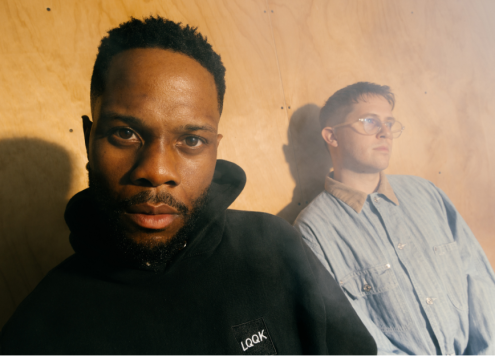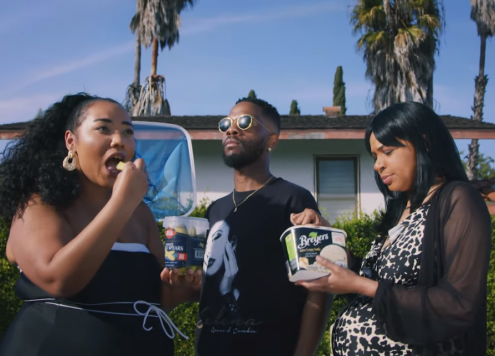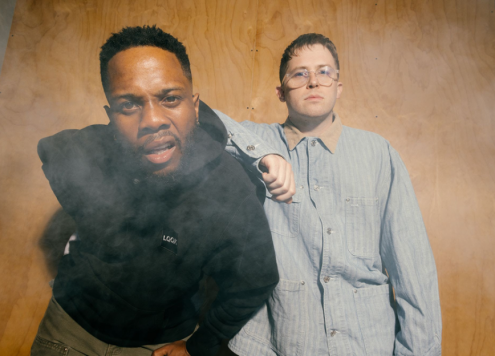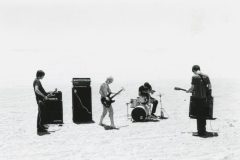No matter what, you will undoubtedly find yourself coming across someone that was feels impacted by the 2016 Presidential race won by Donald Trump. The victory over then-Secretary of State Hillary Clinton continues to be one of the most impactful moments in American history. For Speedy Ortiz’s own Sadie Dupuis, seeing Clinton go down was devastating yet liberating. It allowed her to have the confidence to scrap what was already finished for Speedy Ortiz’s third album and start anew.
Four months later, Dupuis came back to Brooklyn’s Silent Barn with the band to flesh out Twerp Verse (out now via Carpark). Here’s Dupuis on the story behind the album title: “You need to employ a self-preservational sense of humor to speak truth in an increasingly baffling world. I call it a ‘twerp verse’ when a musician guests on a track and says something totally outlandish – like a Lil Wayne verse – but it becomes the most crucial part. I like ‘twerp’ as a diss, but in this meaning, the twerp is doing a service–shaking things up by being bold, not complacent, never silent.”
Mixed by Omaha’s Mike Mogis (Bright Eyes, Rilo Kiley) and mastered by Grammy-nominated engineer Emily Lazar (Sia, Haim, Beck), Twerp Verse is the first album for Andy Molholt (Laser Background) since joining the band. Maintaining a sense of urgency throughout the album, Speedy Ortiz still manages to keep their DIY spirit alive while they spread some light-hearted fun, which is much needed these days. As for Dupuis and her songwriting, the growth continues to show off in each track within Twerp Verse.
Ghettoblaster recently caught up with Dupuis to chat about election night, what the future holds for the scrapped album, what Speedy Ortiz what to achieve, and more.
Being on the road, what is it that you find it to be special?
Lots of it! Seeing old friends in different cities, learning about great new bands, checking out the best local venues/cafés/swimming holes/recording studios/bookstores, getting to meet fans after the shows and being able to put a face to the Twitter and Instagram handles we talk to online.
You moved to Philly not too long ago. What was the reasoning behind the relocation?
I’m from New York, but I’d spent about seven years in Massachusetts in total–I was no longer working a day job apart from music, and most of my friends and even bandmates had moved away, so I didn’t have a big reason to stay. Lots of my Western Mass and Boston friends relocated to Philly, which I’d always loved visiting on tour, and I really admired the music scene there. Plus, the winters are less brutal than in Mass, and I’m still pretty close to my mom.
Being in town for about two plus years, have you found yourself having any influence on the environment around you?
I’m not home a ton due to touring, and I’m still a newbie to the scene–I don’t have the hubris to say I’m at all influential to my scene. But I’m certainly inspired by a lot of the bands in Philly–Old Maybe, Palm, Vexxed, Sammus, Shamir, Hop Along, Sieve, Screaming Females, Moor Mother, just to name a few–and the activist bent of the scene, especially the label Get Better Records. I love my neighborhood too and feel it’s good for my productivity as an artist. Lots of trees and beautiful old houses and pretty gardens and parks that are a nice reprieve when I feel like I should stop hunching over my computer and take a walk.
How much was finished for the now-defunct third LP?
We recorded a whole album, but we kept some of the songs for Twerp Verse and used some of them for a bonus 7” and some for the Japanese version of the record and some are TBD.
With the discarded album, I read that the lyrics were pretty personal and on the happier side of things. Do you feel that it’s tough to be so open during your writing process at times?
I don’t feel that the songs were too “open,” I just felt that I had outgrown that kind of subject matter and it felt weird to release music that didn’t reflect my current mindset and preoccupations. It’s hard to be excited about songs when your heart isn’t in them. I wrote most of the scrapped stuff, love songs or break up songs or whatever, in 2014. By 2016 my head was in a very different place, which I imagine many Americans with a conscience can relate to.
Do you ever see yourself going back to those scrapped songs and possibly releasing them? Perhaps a “lost album” release?
See above.
Walk me through your emotions that you were experiencing on Election Day back in 2016. What was going through your mind when you saw the results coming in that night?
I voted in the morning in Philly, and at night I was in New York at MTV as one of the musicians playing their election night special. There was levity and optimism to the coverage, and conversations centered around how we would hold Clinton accountable to her campaign promises to her constituents of color and queer people–because of course she would be elected! I left after my set, got on the train for about an hour, and by the time I got off the subway I had a bunch of texts, like, “WTF he’s going to win.” I went into a bar so I could watch the results come in, in disbelief and anger and then crying, and the next morning it was sort of the same stages of grief–did that really happen last night? I really didn’t believe that so much of our country–especially white women–could elect someone who ran on a platform of racism and had been recorded admitting to sexual assault, not to mention his utter lack of qualifications. It was a big wake up call for those of us who had the privilege to think that America wasn’t as bigoted as the election proved we were. Capitalism protects very few of us, and while every day feels sort of like a horror show, it has been heartening to see more people turning up to marches and protests and actions in support of those whose homes and families and lives and health and identities have been threatened so far. A lot of the record wound up being about that optimism, putting faith in activist groups and young progressives. Even though things seem bleak, if we lose optimism entirely, that means we’re giving up and that nothing is going to improve. And we are certainly electing more progressive candidates across the board. This is fresh in my mind because the election was yesterday, but two years ago I voted for John Fetterman in the Senate Democratic primary in Pennsylvania, a super progressive candidate who lost out to a more moderate democrat (who ultimately lost to a Republican who voted for Trump). Yesterday Fetterman won the Democratic primary for lieutenant governor. It’s nice to see some of these changes starting to happen a few years after such a catastrophic political event like Trump’s election.
With the social climate being at an all-time high right now, we are seeing quite a significant amount of protesting. Having the platform that the band has these days, do you feel that you are obligated to speak out on issues pressing many individuals?
Yeah, we feel very lucky to have a platform, and we like to use it to redirect attention and financial resources to the issues we feel are important. We try to do fundraising for non-profits as often as possible and have even done a whole tour that was not for profit with proceedings benefiting Girls Rock Camp Foundation. Right now we’re collecting donations on tour for Islamic Relief’s Palestine Emergency Appeal. We’ve also partnered with a few local restaurants on this tour to do Speedy Ortiz-themed specials with a portion or all of the proceeds going to charities we decide on together–a few food justice organizations and some accessible education non-profits.
Eve Babitz, Aline Crumb, Dorothea Lasky were also significant influences within the music for Twerp Verse. What was it about these individuals that spoke to you so profoundly?
I wouldn’t say they were super direct influences on the album, especially Babitz and Kominsky-Crumb who were writing in such different time periods, though I have read a lot of those three women in the past few years while this record was getting made and surely I’ve absorbed a lot of that. But they all have qualities I really value in prose and poetry and comics, and that I try to incorporate into my own lyrics: humor, sensitivity, extreme self-scrutiny, and a feminist worldview.
How long did the recording process take for Twerp Verse after scrapping the already finished work?
About four months of writing, a week of rehearsing, four days of tracking, a couple of weeks mixing, and then mastering. Then a few more weeks on the artwork.
What are some of the goals that Speedy Ortiz still want to reach?
It would be great to keep doing what we’re already doing–making songs and sounds that make us happy, and that feels like growth. I love that we can hire the crew we want to hire, invite the bands we like to tour with us, and do so in a way that’s inclusive and increases visibility for people of diverse identities in this not very diverse field. And I love that we’ve been able to work with so many amazing non-profits. That said, there are lots of parts of the world we haven’t toured that I would really love to visit–South America and East Asia are big priorities.











Social Media